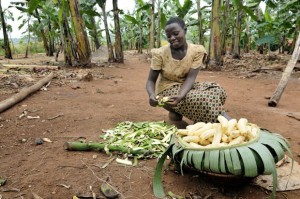 INDIGENOUS SEED PRODUCTION IN KENYA
INDIGENOUS SEED PRODUCTION IN KENYA
The Green Revolution (AGRA) is considered a milestone in Kenya’s quest for self-reliance in food grain production. The revolution has helped countries like India to increase grain production from a modest 50 million ton in 1950-51 to of 209 million ton in 2000. However, the increase has come by promoting chemical fertilizers and high yielding variety seeds. This has led to the loss of crop varieties, erosion of genetic diversity, extinction of local seeds and the livelihood of farmers who could not continue to buy expensive chemicals and seeds. India is an agrarian country with around 70% of its people depending directly or indirectly upon agriculture. Farmer suicides account for 11.2% of all suicides in India.
Most small and marginal farmers in Western Kenya traditionally have dedicated part of their land to grow food for their family’s consumption, in addition to growing maize and sugarcane for the market. Now land is increasingly devoted to crops grown solely for the market, leaving the family with little or no homegrown food. Those affected the most are so called, ‘poor people’s crops’ that have no importance for the international market, but are crucial for local subsistence economies. These are threatened with extinction as farmers adopt Green Revolution and commercial crops. Further increase in the use of chemical fertilizers, pesticides and high-yielding variety seeds have led to degradation of the soil, increase in the cost of farming and exposure to carcinogenic pesticides and fungicides.
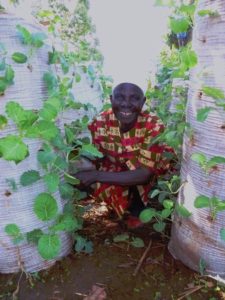 In Kenya, as in many developing countries, growing numbers of people are facing fewer economic opportunities. Because of lack of opportunities at home, male laborers often migrate from the villages to big cities for jobs, leaving their wives and children behind. When husbands and children migrate from home, the women are left to hold the remaining family together, often with very little income.
In Kenya, as in many developing countries, growing numbers of people are facing fewer economic opportunities. Because of lack of opportunities at home, male laborers often migrate from the villages to big cities for jobs, leaving their wives and children behind. When husbands and children migrate from home, the women are left to hold the remaining family together, often with very little income.
In the recent months, farmers have noted an increase in the number of seed companies opening doors in and around Kiminini, the home of Common Ground for Africa. Many farmers have approached the organization to establish a Demonstration Garden for indigenous seeds and organic farming techniques, especially maize so that their fellow farmers can witness the benefits of local seeds and counter the multi-national seeds companies. In addition to the demonstration farm the farmers are also want to run a campaign to ensure they have a representative at the county assembly to represent them on farming issues.
COMMON GROUND FOR AFRICA (CGA)
Common Ground for Africa (CGA) is a grassroots organization with programs in Kenya and in other Africa nations which focus primarily on reducing poverty and promoting self-sufficiency. When CGA started in 1995, their workers found it extremely difficult to gain the trust and confidence of the communities that they wanted to reach. CGA was slowly accepted by the rural communities in which they work by offering services such as women’s empowerment, micro-enterprise development and micro-credit, education and GROW BIOINTENSIVE agriculture.
PROJECT GOALS
CGA farmers’ goal is to develop long-term sustainable solutions to counter the effects of corporate companies on marginal farm households and landless women and their families. With Funds secured for this project, CGA will establish a big demonstration farm, growing local maize seed and help farmers elect a local representative for the county assembly to help spearhead the rejection of international multi-million dollar seeds companies in Kitale/Kiminini region to:
– Establish a demonstration farm to promote the production of indigenous maize in Trans- Nzoia County.
– Elect a representative in the county assembly.
– Promote sustainable and GROW BIOINTENSIVE agriculture practices
PROJECT STRATEGY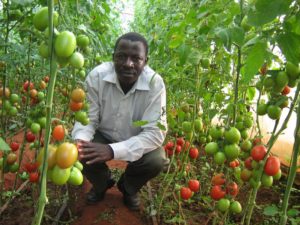
In order to attain its objective of promoting GROW BIOINTENSIVE agriculture, CGA will work at the micro and macro level. At the village level, CGA will work with farmers’ groups to create models to demonstrate GROW BIOINTENSIVE farming practices and preserve local varieties of seeds. CGA will take part in forums at the state and national level to influence government policies.
The farmers’ groups consist of around 20-30 members belonging to the same neighborhood. The groups decide on the date and time of meetings, elect their own office-bearers and make collective decisions on matters relating to group activities. Micro-credit is given for a range of income generation activities like – small trade, vegetable cultivation and vending, goat rearing, honey production, cow rearing, backyard poultry, basket weaving, bangle making etc. 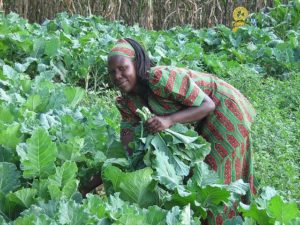
The newly formed company, if funding is received, will promote the use of non-chemical pesticides, indigenous seed processing and traditional farming practices. A consequence of modern agriculture is the introduction of high yield uniform crops through genetically modified seeds, which promote mono variety of seeds that are baron and are not collected to grow the next season. This seriously erode the local variety of seeds. CGA has found that local varieties of wheat have been completely replaced by seeds produced by multinational corporations, denying farmers the control over the variety they want to sow. In order to prevent the same from happening to maize and vegetables, CGA has been tasked by farmers to form seed banks in the villages to identify traditional varieties, encourage farmers to cultivate local varieties of seeds and conserve them for future use. The seed bank will work on the principle of a revolving fund and will be under the management of farmers’ groups. At the end of the season the farmer will return the seeds taken from the seed bank. These seeds will then be given to other farmers in the project or sold to outside farmers and this will have a multiplying effect. The idea is to promote local variety of seeds and ensure that a regular supply is available in the village for farmers to access.
CGA will promote the adoption of organic fertilizers like composting creating healthy soil for earthworms and other organisms. The earthworms ingest vegetable matter, waste, soil etc. and excrete pellets of finely ground soil very rich in nitrogenous material. This rich manure minimizes the need for fertilizers, makes the soil healthy and increases crop yield. The program is targeted at women who depend on their homestead land to raise vegetables for own consumption and to sell in the market. 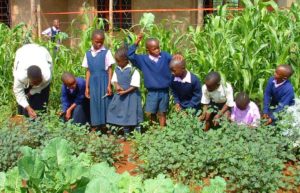
CGA will promote direct linkage between farmers and consumers, to get a better price. Traditionally farmers sell their produce to the private traders at a throwaway price. CGA will get the farmers’ members to add value by threshing the seeds, cleaning, putting them in packages and then selling it in the cities. CGA will market the vegetables by highlighting their organic production and taste qualities.
In order to bring about policy changes, CGA will collaborate with groups like the Public Interest Research Group (PIRG, Delhi), Food Security Forums and African Biodiversity Networks. The idea is to get the government to move away from the narrow focus on food production (as is the case with Green Revolution) to issues of conservation, sustainability and accessibility.
PROJECT OUTCOME
At the grassroots level, CGA is creating models in Trans- Nzoia County, the proposed area in this proposal, to:
– Promote and preserve traditional varieties of seeds (Maize )
– Adopt GROW BIOINTENSIVE farming practices
– Campaign to elect farmer’s representative at the County Assembly
The long-term implications of this project will be to get policy makers to adopt:
– ‘Food first’ approach while deciding on crops – first meet local food needs, environmental and then on cash.
– Emphasize agricultural development in poor and backward areas away from relatively well endowed and prosperous areas where the high yield variety seeds and chemical technology spread quite fast
– Promote GROW BIOINTENSIVE farming as well as farming based on local resources
– Better and more effective role of farmers in the food security system
PROJECT ADMINISTRATION
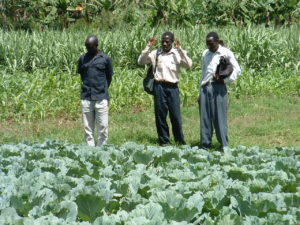 Joshua Machinga, the CEO of CGA will provide the key leadership for the project. Joshua Machinga has been trained on Organic Seed production in Mexico and has many years of experience in GROW BIOINTENSIVE farming. He was an intern at Ecology Action in 1995.
Joshua Machinga, the CEO of CGA will provide the key leadership for the project. Joshua Machinga has been trained on Organic Seed production in Mexico and has many years of experience in GROW BIOINTENSIVE farming. He was an intern at Ecology Action in 1995.
The project will also be supported through Village Volunteers as a 501 C3 non profit organization. We are trying to raise $10,000 to to promote a campaign to elect farmers representative at County Assembly farmers on the general assembly but we can start with a $3,000 a budget to get the Seed Project and Demonstration Garden unerway. .
Support Sustainable Solutions to Community Challenges! Donate/ or contact us with information on funding options at Shana@villagevolunteers.org.
